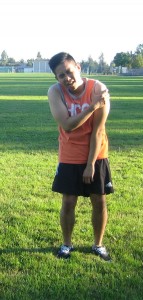The rotator cuff is comprised of muscles and tendons that connect them to the bones in the shoulder. Always bear in mind that the rotator cuff is responsible for connecting the upper arm bone to the shoulder blade, thus allowing lifting of the arm to the side as well as rotating it away from and toward the body.
Rotator cuff problems include tears in the tendons or muscles as well as tendinitis. These issues can develop abruptly due to injuries or gradually over time. Any form of damage to one or several parts of the rotator cuff can lead to diminished mobility, pain, weakness or a clicking sensation in the shoulder.
Pain
Remember that pain is the initial sign of a rotator cuff problem and tends to vary depending on the exact cause. In cases of traumatic rotator cuff injuries, they can cause immediate, intense shoulder pain.

Overusing the rotator cuff muscles can cause damage that worsens over time. This is quite common in sports or activities that involve repetitive overhead movements especially while lifting heavy objects. Take note that this motion compresses the tendons that attach to the rotator cuff muscles.
The pain from overuse is similar to a deep ache that becomes worse in the evening, especially if the individual frequently reaches overhead throughout the day. In some cases, the pain might be infrequent at the start. As the damage progresses, there is shoulder pain even while at rest. There is also possibility for the pain to radiate to the side of the upper arm and affect sleep at night especially if the individual is used to rest on the sore side.
Diminished mobility
As a ball-and-socket joint, the shoulder is responsible for moving the arm as well as keeping the bones that meet at the shoulder in their respective positions. Diminished mobility of the shoulder is a usual symptom for rotator cuff problems.
The individual might find it hard to lift his/her arm out to the side, reach behind the back or rotate the arm outwards. In most cases, movement is limited due to the pain especially with rotator cuff problems that develop over time. In severe injuries such as a tendon tear, it might be impossible to move the arm in a particular direction.
Weakness
The damage on the rotator cuff muscle can lead to loss of strength, particularly when the individual reaches overhead. Once the arm is lifted to the side, the shoulder is hiked toward the ear. This is an attempt of the body to utilize other muscles instead of the damaged rotator cuff muscles.
This is noticed when attempting to brush the hair or reaching into a high cupboard. There is also weakness when rotating the arm away from or towards the body. The weakness can be debilitating since it affects various activities of daily living such as tucking a shirt or even turning a steering wheel.
What are the other symptoms?
Some rotator cuff problems can cause a clicking sensation in the shoulder especially during certain movements such as lifting the arm out to the sides. There is also a crackling or crunching sensation that can be heard as well. Take note that this occurs once the damaged tendons rub against the bones in the shoulder joint.
When to consult a doctor
A doctor should be consulted if there are symptoms that might indicate damage to the rotator cuff or if the shoulder pain persists for more than a few days, particularly if it disrupts with daily activities. Rotator cuff problems that progress over time can heal with the help of medications and physical therapy. In case the injury is due to trauma, a doctor should be consulted. Remember that severe injuries such as a torn tendon often entail surgical intervention.
